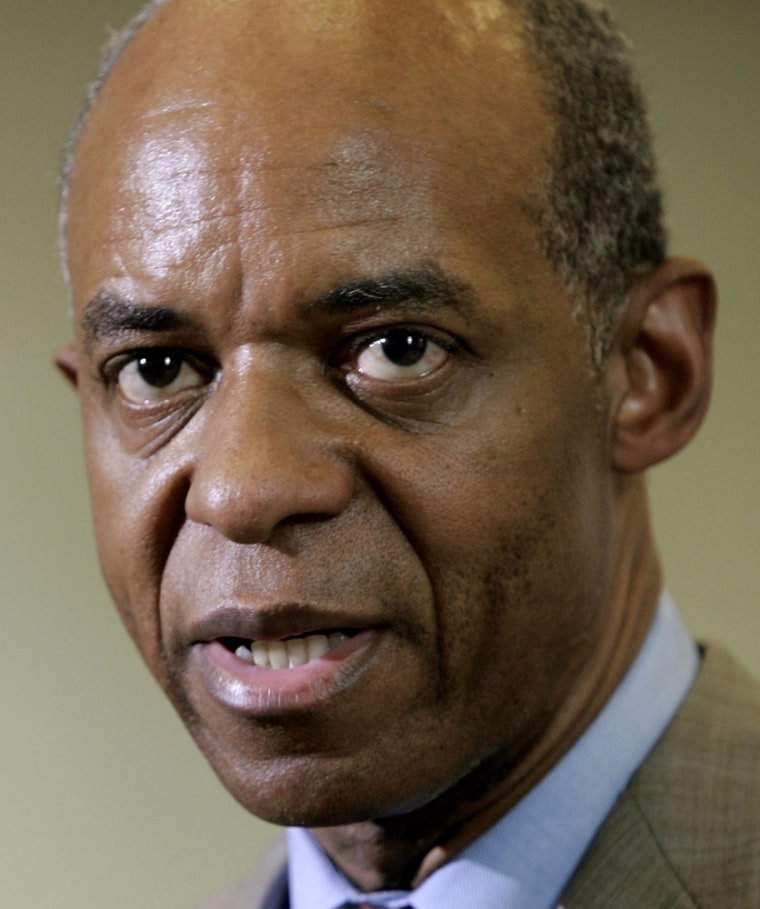The House voted Friday to take away besieged Rep. William Jefferson’s committee seat, then dispatched its own lawyers to join him in court to seek the return of documents seized in a federal bribery probe.
Both the political punishment and the legal case appeared to be without precedent. Jefferson has not been charged with a crime, and officials said last month’s FBI search of his congressional office was a first.
The events marked the latest turns in a controversy with legal, political and racial elements, all centering on the 59-year-old, eighth-term lawmaker from New Orleans.
Two men have been convicted as part of the bribery scandal surrounding Jefferson. And while the congressman has not been charged, the FBI says it found $90,000 in bribe money stashed in a food freezer in his home.
An ethical standard
House Democratic leaders pushed for his Ways and Means Committee assignment to be taken away. Nancy Pelosi, the party’s House leader, has said repeatedly that Democrats will be held to the highest possible ethical standards, while she and others in her party accuse Republicans of nurturing a “culture of corruption.”
“Mr. Jefferson has legal issues that he and his family must deal with. Mrs. Pelosi has political issues that she and her caucus must deal with,” said Rep. James Clyburn of South Carolina, chairman of the Democratic caucus.
His remarks reflected the political forces at work — an attempt by Pelosi, D-Calif., to make ethics a campaign issue in a Democratic bid to win control of the House this fall.
Jefferson, who maintains his innocence and has criticized Pelosi for her action, had no comment on the vote by fellow lawmakers. He was present during the few seconds it took for the House to act, having been involved in a huddled conversation with fellow members of the Congressional Black Caucus who argue he is being treated unfairly.
Clyburn did not want vote
Under House rules, any lawmaker could have sought a roll call vote that would have required all members of the House to make their positions known publicly.
None did.
Clyburn told reporters afterward that most members of the Congressional Black Caucus did not want a vote, despite their accusation that Pelosi was subjecting Jefferson to a sanction without a rule or precedent to justify it.
The CBC issued a statement last week saying Jefferson was entitled to a constitutional presumption of innocence.
Wide-ranging corruption
In court, later in the day, District Judge Thomas F. Hogan gave voice to anxieties that some lawmakers might be feeling about the FBI search and confiscation of documents at Jefferson’s office.
Noting the wide-ranging corruption investigation linked to convicted Republican lobbyist Jack Abramoff, Hogan asked what would prevent FBI agents “from marching up there time and again” to search the offices of implicated lawmakers.
Assistant U.S. Attorney Roy McLeese replied that searches would first have to be approved by a federal judge, as happened in the Jefferson case. He said the Jefferson raid was lawful and urged the judge not to accord the lawmaker special treatment.
The legal arguments took place at a hearing Friday before Hogan, who approved the controversial FBI search of Jefferson’s congressional office on the weekend of May 20-21.
Robert Trout, Jefferson’s lawyer, told the judge that FBI agents were not selective in their search. Agents were “pawing through every record in that office,” Trout said.
“That is the offense we say occurred here, and that is what we say is unconstitutional,” he added. “They took every single hard drive in the place.”
Trout said it is for members of Congress to decide which legislative records are beyond the reach of the executive branch. He told a skeptical Hogan that his warrant authorizing the seizure was too broad.
Different from everyone else
In a lawsuit, Jefferson and the House are seeking the return of documents, computer files and any other material seized during the 18-hour search of his office suite across the street from the Capitol.
At issue is a constitutional provision known as the speech or debate clause, which protects senators and representatives from being questioned by the president, a prosecutor or a plaintiff in a lawsuit about their legislative work.
“I grant you ... it results in members of Congress being treated, in this instance, differently from anybody else,” said Kerry Kircher, a lawyer for the House leaders. The founding fathers put the language in the Constitution to prevent the executive branch from intimidating the Congress, Kircher said.
Hogan appeared unmoved by that argument. “How is it intimidation or harassment of Congress when it’s once in 218 years?” he said.
“There is probable cause to believe the materials recovered from Rep. Jefferson’s office contained evidence of serious crimes,” McLeese said. “It would be a remarkable conclusion of law” if the Justice Department were ordered to return the materials sight unseen.
Congressional leaders in both parties have made it clear they do not want to interfere with the investigation into allegations against the Louisiana lawmaker, even though they have sided with him in this legal dispute.
